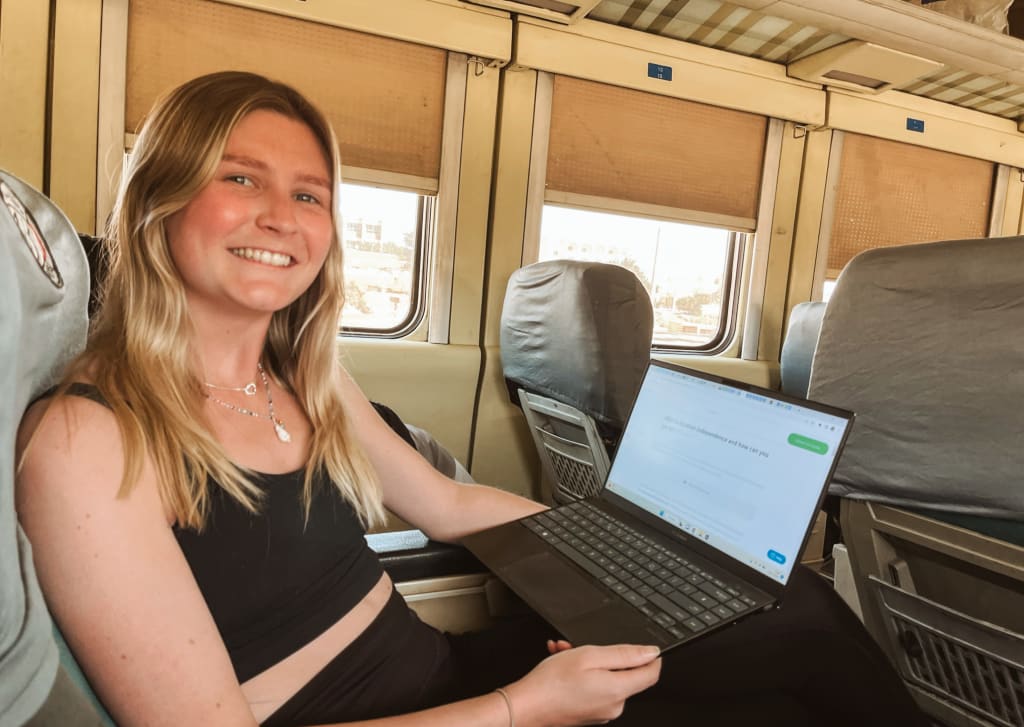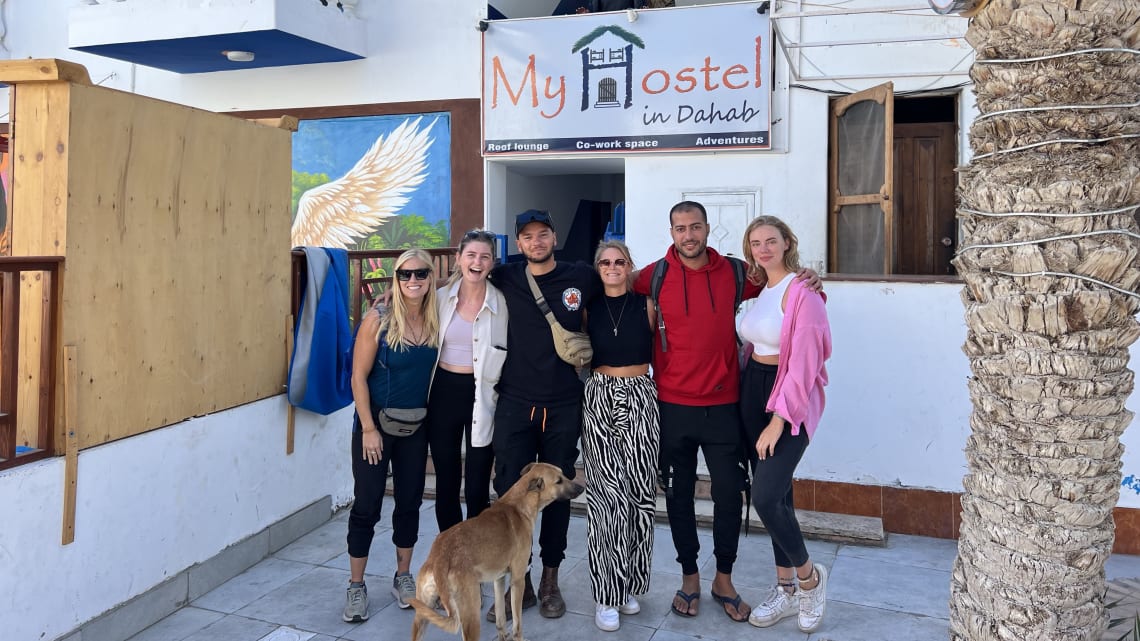
- How about winning a flight ticket worth up to US$500?
- Become a member by January 31st and get a chance to win!
Being able to work remotely and be location independent gives you unbelievable freedom. In this article, find out what location independence means and how to achieve it!
9min

During and after the pandemic, a lot of things switched in people’s minds. Many of us realized that we wanted more from life. Sitting in an office all day and living the same day over and over isn’t how we dream of spending our lives.
This newfound awareness of how important it is to live life, coupled with the realization that most jobs can be done remotely has sparked a lifestyle revolution. People want to be location independent. They want to be earning an income from anywhere their heart desires.
These thoughts have been catalyzed by social media. Every day we’re overwhelmed with images of digital nomads ‘living the life’, traveling to wherever they want and pitching up their laptops on a beach somewhere. That’s the life that a lot of us desire to have now.
But is it realistic? What does location independence actually mean? Can anyone be a digital nomad? These are the kinds of questions that I’m going to answer throughout this article.
There are a ton of buzzwords floating around at the moment that all have a very similar meaning — remote worker, digital nomad, and location independent. But what do they all actually mean?
Someone who is ‘location independent’ is free from a place or isn’t needed to be physically present anywhere. Being location independent means that you can live and work from anywhere that you want. You’re tied to nowhere.
Being location independent and a digital nomad are pretty similar things, with a slight caveat. A digital nomad is someone who earns their income online, whilst traveling around the world.
Someone who is location independent still makes their money online, but travel isn’t necessarily their priority.
If becoming a digital nomad is something you’re interested in, look no further, Worldpackers have a whole host of resources on the topic.
The third word that you might hear is remote worker. This is simply someone that is working outside of the traditional office environment.
They could just be working from their house in their home country rather than working from an office. They don’t necessarily travel and it doesn’t mean they’re working from a different country. But the options are always there!
A digital nomad and a location-independent person are both remote workers.
Find out how to work remotely and if it’s as good as it sounds.

So, location independence means that you can live and work from wherever your heart desires. Everyone reading this article is likely to be at a different stage on the journey to becoming location independent. There are a number of things that you’ll need to consider and do before you can become location independent.
Your job is usually the biggest factor that decides whether you can be location independent or not. If your work doesn’t allow you to work remotely, then being location independent will only last so long until you run out of money, or get fired if your work realizes you're working from another country without permission.
Since the pandemic, we've noticed that a lot of jobs can be done remotely, some easier than others. It also depends on whether your employer is happy with the idea of you working from another country.
There are compliance challenges that companies have to consider when an employee works from a different country. Taxes for example. My recommendation is to first speak to your employer to gauge whether working remotely is possible. If they’re not happy with this, maybe you’ll need to look for another employer.
If finding an employer who will let you work remotely is turning out to be harder than you thought, why not start your own online business?
Having your own online business gives you ultimate freedom. You don’t have anyone telling you when to work and from where.
With many online businesses, a lot of the processes can be automated, meaning you’ll be generating a passive income — the dream! You can be enjoying yourself, surfing or climbing a mountain, and you’re earning money at the same time.
Here are some online business ideas to get the creative juices flowing:
My only word of advice is don’t get sucked into the Instagram accounts selling courses on how to set up your own online business and be achieving 5 figures in months. Most of the time these are pyramid schemes full of empty promises.
Also not having a boss telling you what to do and giving you deadlines can be challenging for some people. Motivating yourself to build your own business whilst being surrounded by distractions can be hard. But if you want to be location independent enough, you’ll do it!
If you’re lucky enough to already be working in an area that facilitates being location independent, then the process should be easier for you. Here are some popular location-independent jobs:
Like I said before, a lot of jobs can be location independent, so don’t be disheartened if you don’t see your job title above. You can usually make it work!
Most of the time the answer is YES! There are so many online resources available that you can teach yourself almost anything. Some of the best programmers are self-taught.
Before becoming a travel writer, I was a Management Consultant with no experience in writing. I’d never taken a course on how to be a good writer or studied literature at university. Instead, I read a lot and learned what I liked to read. This is how I write, and people seem to enjoy it.
Learning a skill takes practice, so if you really want to be location-independent, practice, practice, practice!
Check out these 7 jobs that you can do whilst traveling.
It’s important to have a good understanding of your finances before becoming location independent.
Will your remote job be able to support you? Are there still costs that you’ll need to be paying at home? How much will you be spending each month in your new temporary home? These are all questions you should have answers to.
For most people, it’s not easy to simply drop everything and move to a whole new country. You may already be renting a property, you might need to rent your property out, or you have a family that relies on you. There are a lot of things that can stop you from leaving.
Like with everything in life, there are always advantages and challenges. It’s the same with being location independent, you have to take the good with the bad. I’ll start with the positives of being location independent:
There is nothing more empowering than being free. Knowing that you can live and work from wherever you want in the world is a very freeing feeling to have. You could choose to work remotely from Spain for a year or find a small coastal town in Egypt for a month as I’ve just done.
Similar to the freedom piece, you can travel as you work. A lot of people will work for a period of time to save up money and then go traveling for months. Being location independent, you can be a digital nomad and work whilst you travel.
If you choose a country with low costs of living such as Colombia, Thailand, or Albania, you’ll likely be saving more money than if you were at home.
For example, I have been working remotely in Egypt and staying in a 2-bedroom apartment with my friend. Can you guess how much we were paying? $5 a night each! For our own apartment! That would be impossible to find in London, where I’m from.
Also, you get to skip the often long and costly commute to work. Instead, your commute can be a stroll to a beach bar to work.
Placing yourself in a country with a different culture, language, and way of life can be challenging. Especially if you do it alone! But these challenges, figuring things out by yourself, lead to incredible personal growth and an increase in confidence.
Living in different places around the world allows you to learn so much about different cultures and history.

One of my favorite things about remote working in another country is that you can meet people from all around the world. There are digital nomad communities everywhere that make it so easy to create connections and friendships.
Like everything in life, the good and the bad walk hand-in-hand. Where there are advantages, there are also some challenges that we might need to face in order to be location independent.
If your reason for becoming location independent isn’t to travel then this one might not be as much of a challenge for you. But if it is, balancing traveling around a country and finding time to work can be hard.
It can be easy to get carried away with your new incredible surroundings. So many adventures lay waiting on your doorstep, but you still have to work the same hours that you did at home.
Initially, it can be hard to find the right balance between working and getting to experience the place you're in. What’s the point in working remotely abroad if you’re going to sit behind your laptop all day? Similarly, is being in a beautiful place enough to let your work start to slip?
I’m still working this one out!
Some places have an amazing digital nomad or traveler community, but some don’t. If you find yourself somewhere that’s hard to meet people, it can get lonely. Especially if you don’t speak the language.
Not having your family around you or a home base can also make you feel disconnected and lonely.
This one affects everyone differently. Some people can take changes in their stride. Others like to know where they’re living next week and have a home base.
Working remotely can mean moving around quite regularly depending on visas and rent. If you’re doing this a lot, it can get tiring.
This can be a positive or a negative depending on how you look at it. Being location independent means that you’re probably not going to be able to have a lot of stuff unless you want to lug it around everywhere with you.
If you don’t have a home base anywhere, you’ll probably have to sell a lot of your stuff or pay for storage. This can be liberating, but also a hassle to sort out and replace if you decide to settle down somewhere.

One way to tackle a lot of the challenges that I mentioned above is by volunteering whilst working remotely. Volunteering allows you to stay in one place for a while, helping you to form a daily routine, stability, and connections in the community in which you’re volunteering.
And finding volunteering opportunities is easy. Worldpackers is a platform that connects travelers and remote workers with welcoming hosts all over the world. They have volunteer opportunities in over 140 countries, so chances are wherever you want to go there will be an opportunity waiting.
Another benefit of volunteering is that in exchange for your skills, you’ll receive free accommodation and sometimes even free meals. This can save you a ton of money!
I taught English at a language institute in Colombia while working remotely. I volunteered 25 hours a week, sometimes less, which gave me plenty of time to still work. There were lots of lovely cafes in Villa de Leyva, where I was volunteering, so I’d spend the afternoon in one of these working after my English classes.
I’ve been traveling for over 2 years now and this is still one of the best highlights from my trip.
If you’ve made it this far, you should have a pretty good idea of what it means to be location independent. Have you decided whether it’s something you would like to be? What are your next steps to becoming location independent?
Fun fact: I wrote this article whilst traveling on a train in Egypt, literally embodying the concept of location independence while writing about it!
If you like these tips, follow Worldpackers social media to keep up with the news: we are on Instagram, Tiktok and YouTube!
Write here your questions and greetings to the author
Jjmoney
Feb 23, 2023
😍
Ibrahim
Feb 25, 2023
Good job 👏
Adem
Feb 26, 2023
How can I join and help possible way I love this job Greetings to you
Baraa
Feb 28, 2023
How can I join
Ayoub
Apr 05, 2023
Are you believe ai ? For independent contractors
maroju
Apr 15, 2023
hi how can i join this jobs
Mohamed
May 09, 2023
Great
El
Jun 30, 2023
Good 👍
Alva
Aug 15, 2023
The author has provided useful advice on location-independent jobs, finances, and other factors needed to achieve this goal.